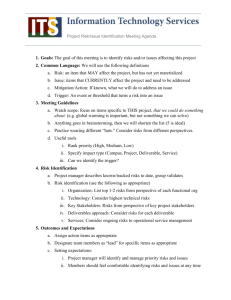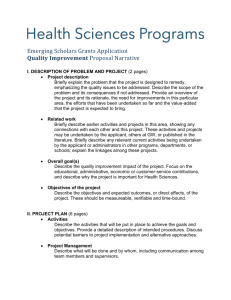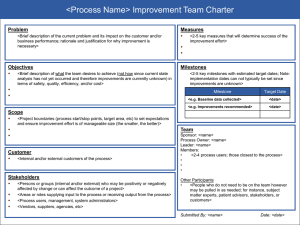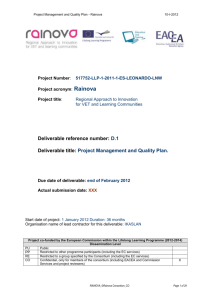instructions for drafting "part b" of your “future travelling” proposal
advertisement
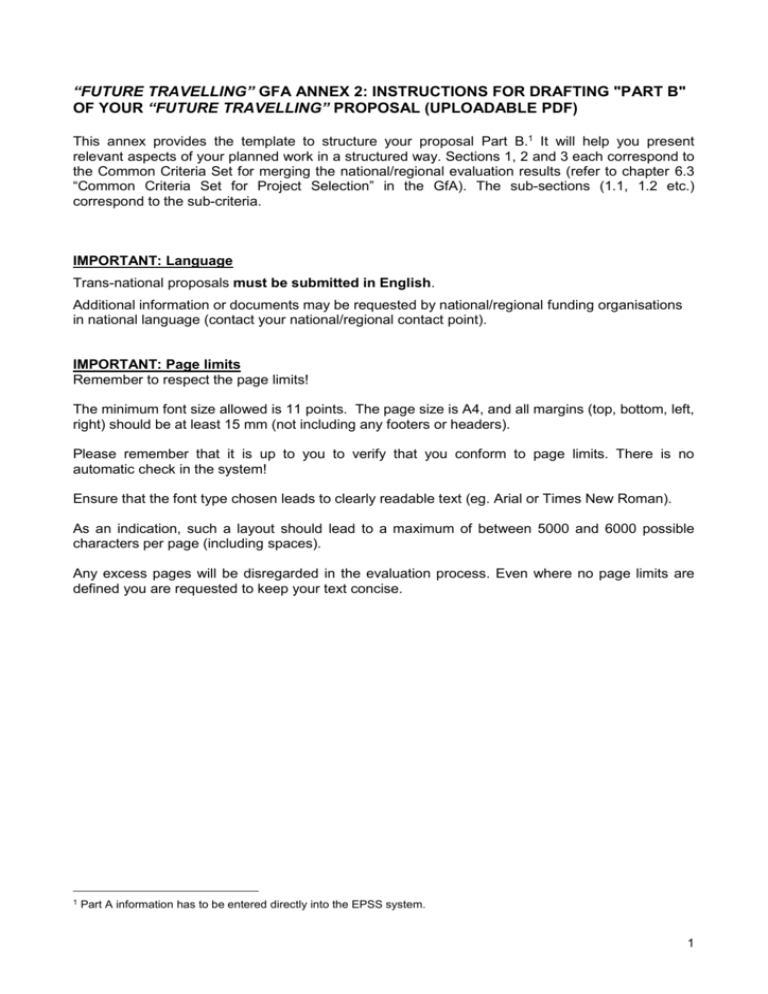
“FUTURE TRAVELLING” GFA ANNEX 2: INSTRUCTIONS FOR DRAFTING "PART B" OF YOUR “FUTURE TRAVELLING” PROPOSAL (UPLOADABLE PDF) This annex provides the template to structure your proposal Part B.1 It will help you present relevant aspects of your planned work in a structured way. Sections 1, 2 and 3 each correspond to the Common Criteria Set for merging the national/regional evaluation results (refer to chapter 6.3 “Common Criteria Set for Project Selection” in the GfA). The sub-sections (1.1, 1.2 etc.) correspond to the sub-criteria. IMPORTANT: Language Trans-national proposals must be submitted in English. Additional information or documents may be requested by national/regional funding organisations in national language (contact your national/regional contact point). IMPORTANT: Page limits Remember to respect the page limits! The minimum font size allowed is 11 points. The page size is A4, and all margins (top, bottom, left, right) should be at least 15 mm (not including any footers or headers). Please remember that it is up to you to verify that you conform to page limits. There is no automatic check in the system! Ensure that the font type chosen leads to clearly readable text (eg. Arial or Times New Roman). As an indication, such a layout should lead to a maximum of between 5000 and 6000 possible characters per page (including spaces). Any excess pages will be disregarded in the evaluation process. Even where no page limits are defined you are requested to keep your text concise. 1 Part A information has to be entered directly into the EPSS system. 1 SUMMARY OF MANDATORY PAGE LIMITS (Conforming to font and margin sizes mentioned above). Section Maximum pages 1. Scientific and/or Technical quality 1.1 Concept and objectives 2 pages 1.2 Progress beyond the state-of-the-art 2 pages 1.3 Scientific and/or Technical associated work plan 2. Implementation 2.1 Work packages i) ii) iii) methodology and 1 page Detailed work description broken down into work packages and tasks: Work package / task list table 2.1a Deliverables list table 2.1b List of milestones table 2.1c Description of each work package / task table 2.1d, 2 pages per WP Timing of the different WPs and their components (Gantt chart or similar) table 2.1e Summary effort table Provide a graphical presentation of the (Pert diagram or similar) components showing their interdependencies Describe any significant risks, and associated contingency plans 1 page 2.2 Management structure and procedures 2 pages 3. Impact 2 pages for the whole section 4. Consideration of gender aspects 1 page 2 Cover Page Proposal full title: Proposal acronym: Table of Contents Proposal 1. 1.1 Scientific and/or technical quality, relevant to the topics addressed by the call Concept and objectives Explain the concept of your project. What are the main ideas that led you to propose this work? Describe in detail the S/T objectives. Show how they relate to the domain(s) addressed by the call, which you should explicitly identify. The objectives should be those achievable within the project, not through subsequent development. They should be stated in a measurable and verifiable form, including through the milestones that will be indicated under section 1.3 below. 1.2 Progress beyond the state-of-the-art Describe the state-of-the-art in the area concerned, and the advance that the proposed project would bring about. If applicable, refer to the results of any patent search you might have carried out. 1.3 S/T methodology and associated work plan Describe the scientific and/or technical methodology and the overall strategy of the work plan. 2. Implementation In this section the work plan has to be presented in detail, i.e. broken down into work packages2 and tasks. The Work packages should follow the logical phases of the implementation of the project, and include consortium management and assessment of progress and results. (Please note that your overall approach to management will be described later, in section 2.2). 2.1 Work packages Please present your plans as follows: i) Provide a detailed work description broken down into work packages and tasks: Work package / task list (please use table 2.1a) Deliverables list (please use table 2.1b) List of milestones (please use table 2.1c) 2 A work package is a major sub-division of the proposed project with a verifiable end-point - normally a deliverable or a milestone in the overall project. 3 Description of each work package, task and role of applicant (please use table 2.1d) iii) Show the timing of the different Work packages / tasks and their components (Gantt chart or similar) Summary effort table (please use table 2.1e) iv) Provide a graphical presentation of interdependencies (Pert diagram or similar) the components v) Describe any significant risks, and associated contingency plans. showing their Note: The number of work packages / tasks used must be appropriate to the complexity of the work and the overall value of the proposed project. The planning should be sufficiently detailed to justify the proposed effort and allow progress monitoring. Table 2.1a: Work packa ge Work package and tasks list Work package title Start mont h4 End mo nth Task title Appli cant No5 Applicant short name6 No3 Pers onmont hs7 TOTAL 3 4 5 6 7 Work package number: WP 1 – WP n. Measured in months from the project start date (month 1). Please list the number of the applicant leading the work in this work package in bold. Please list the short name of the applicant leading the work in this work package in bold. The total number of person-months per applicant allocated to each work package / task. 4 Table 2.1b: Del. no.8 Table 2.1c: Deliverables List Deliverable name WP no. Delivery date9 List of milestones Milestones are control points where decisions are needed with regard to the next stage of the project. For example, a milestone may occur when a major result has been achieved, if its successful attainment is required for the next phase of work. Another example would be a point when the consortium must decide which of several technologies to adopt for further development. Milestone number Table 2.1d: Milestone name Work package(s) involved Expected date 10 Work package description To be duplicated for each work package! Work package number and title Objectives Description of work (broken down into tasks and role of applicants) Deliverables (brief description) 8 9 10 Deliverable numbers in order of delivery dates. Please use the numbering convention <WP number>.<number of deliverable within that WP>. For example, deliverable 4.2 would be the second deliverable from work package 4. Measured in months from the project start date (month 1). Measured in months from the project start date (month 1) 5 Table 2.1e: Summary of staff effort A summary of the staff effort is useful for the evaluators. Please indicate in the table the number of person months over the whole duration of the planned work, for each work package / task, for each applicant. Identify the work-package leader for each work package by showing the relevant WP/task and person-month figure in bold. Applicant Applicant no short name WP1/task WP2/task WP3/task … Total person months Total 2.2 Management structure and procedures Describe the organisational structure and decision-making mechanisms of the project. Show how they are matched to the complexity and scale of the project. (Maximum length for Section 2.2 two pages) 3. 3.1 Impact Expected impacts Describe how your project will contribute to the call domain and content related aims and research questions listed in the “Future Travelling” (GfA chapter 3) and to the call related scope and objectives as such (chapter 2.2 of the GfA). Mention the steps that will be needed to bring about impacts in this relation. Explain why this contribution requires a European (rather than a national or local) approach. Indicate how account is taken of other national or international research activities. Mention any assumptions and external factors that may determine whether the impacts will be achieved. 3.2 Dissemination and/or exploitation of project results, and management of intellectual property Describe the measures you propose for the dissemination and/or exploitation of project results, and how these will increase the impact of the project. In designing these measures, you should take into account a variety of communication means and target groups as appropriate (e.g. policymakers, interest groups, media and the public at large). Describe also your plans for the management of knowledge (intellectual property) acquired in the course of the project. (Maximum length for the whole of Section 3 – two pages) 6 4. Consideration of gender aspects You may give an indication of the sort of actions that would be undertaken during the course of the project to promote gender equality in your project, or in your field of research. (These will not be evaluated, but will be discussed during negotiations should your proposal be successful). These could include actions related to the project consortium (e.g. improving the gender balance in the project consortium, measures to help reconcile work and private life, awareness raising within the consortium) or, where appropriate, actions aimed at a wider public (e.g. events organised in schools or universities) (Maximum length for section 4 – 1 page) 7
